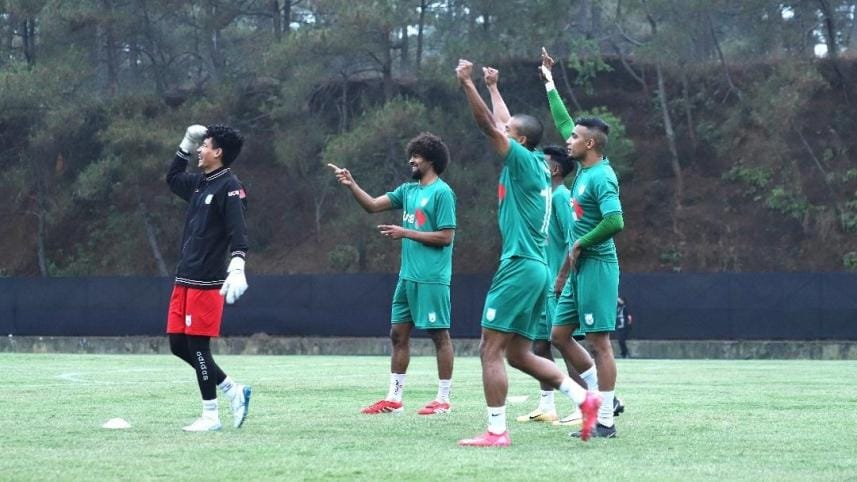Bangladesh football riding the Hamza wave

When Bangladesh football team captain Jamal Bhuiyan told the press on Thursday, "It feels our [Lionel] Messi is here," about the arrival of Hamza Choudhury, he wasn't exaggerating.
Hamza's tryst with Bangladesh football till now – his arrival, the two-day visit to his ancestral home in Habiganj, him joining and then training with the Bangladesh team –has been treated like an event by the local media and lapped up with tremendous enthusiasm by the fans.
Seeing Hamza don the Bangladesh jersey has been a dream for legions of fans for years. And now, as the midfielder currently playing for Sheffield United in the English Championship League, who has represented England at age-level, and has nearly 100 appearances for former English Premier League (EPL) champions Leicester City, is days away from representing Bangladesh on the field, the excitement among fans and officials has reached the zenith.
Along with the excitement, inevitably, there also comes expectations. Hamza is set to debut for Bangladesh with the highly anticipated clash against India in an Asian Cup Qualifiers match in Shillong on March 25 and fans are hoping to see their ace from England bamboozle their neighbours in the tie.
However, the reality remains that football is a team sport. An individual, no matter how brilliant, can't win matches alone. If not, it wouldn't have taken Messi five attempts to win the World Cup.
Hoping that Hamza alone can transform Bangladesh's footballing fortunes won't be prudent, but still, his influence both on and off the field has the potential to be transformative.
A strong defensive midfielder who can also play as a right-back, Hamza's tactical awareness and European football experience will bring a new dimension to Bangladesh's squad. But at the same time, Hamza would also have to adapt to South Asian football's unique challenges, something his current captain can give him a few pointers about.
Hamza's story draws parallels with that of Jamal, who first came from Denmark in 2011 and struggled in the Bangladesh Football Federation's (BFF's) trials, and was initially overlooked. However, he persevered, returned to the domestic league, and eventually became the leader of the team.
Players like Tariq Kazi and Syed Shah Kazemi Kirmani have followed Jamal's path, proving that foreign-based talents can thrive if given time and support. Hamza's journey in Bangladesh might similarly get off to a jerky start, but his long-term potential is immense.
Hamza's decision to play for Bangladesh could pave the way for more players of Bangladeshi heritage to make the jump. BFF has been actively scouting talents from Europe and North America, hoping to strengthen the squad with foreign-based players.
Many nations have successfully adopted this approach. Sri Lanka has naturalised around 14 foreign-based players, Afghanistan boasts a squad largely composed of foreign-born talents, helping them rise in Asian rankings, and Indonesia has integrated European-based players which has led to dramatic improvements in their international performance. Bangladesh is now trying to follow suit.
Hamza's presence has already drawn international attention and sparked newfound enthusiasm for the national team. BFF, who usually struggle for sponsorship, has recently secured a long-term sponsor for the men's national team. Additionally, his influence could also inspire a new generation of young footballers in Bangladesh.
But Hamza's presence alone is not enough to ensure sustainable growth in Bangladesh football. For that the BFF must develop better football infrastructure, improve state of domestic football, and invest in youth development.
If these elements come together, then Hamza's arrival could become the catalyst for a new era in Bangladeshi football. For now, he may not be the ultimate solution, but he is certainly a step in the right direction.



 For all latest news, follow The Daily Star's Google News channel.
For all latest news, follow The Daily Star's Google News channel.
Comments